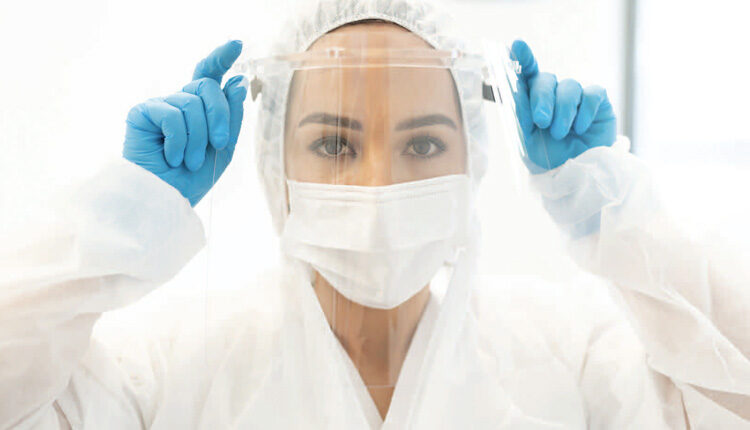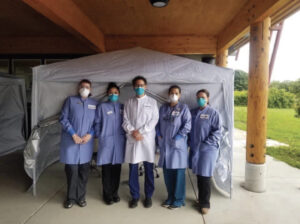 ONIO_DIAZ/ISTOCK/GETTY IMAGES PLUS
ONIO_DIAZ/ISTOCK/GETTY IMAGES PLUS
Dental Therapists Provide Essential Care During COVID-19
Washington State dental therapists practicing in tribal clinics implemented several effective strategies to support the oral health of the patients they serve.
What can primary oral healthcare providers do to keep their communities healthy during a global pandemic? Dental therapists in Washington State tribal clinics are using several effective strategies and proving to be essential caregivers. While the effects of COVID-19 will be severe and long-lasting, the work of these dental therapists will help to mitigate the oral health consequences in their communities.
Urgent Care
Even during periods when dental offices and clinics were required to close, urgent care needs had to be addressed. In fact, continuing to care for urgent oral health needs has been critical to supporting the community’s health and keeping the treatment of toothaches out of hospital emergency departments. Fortunately for communities with dental therapists, these providers are trained to treat many dental emergencies—from restorations to pulpotomies to simple extractions. If prescriptions are needed, they can be provided remotely by a supervising dentist.
At the Port Gamble S’Klallam Clinic in Kingston, Washington, the dental therapist was the only provider available to care for urgent dental needs. The clinic’s dentist, Eldon Bloch, DDS, stayed home as he is at increased risk for severe illness due to COVID-19, but remained available for general supervision, while Rochelle (Roz) Ferry, licensed dental therapist (LDT), provided urgent care. “Toothaches don’t stop for a pandemic,” Ferry says matter-of-factly. For procedures beyond her scope, Ferry was able to refer to an oral surgeon until her supervising dentist returned to work in the clinic.
Bloch shares his gratitude, “Ferry has been a huge asset to this organization since day one, and I rely on her for many things. She always does excellent work and steps up to see patients even when conditions are not the best. I was thankful to be able to rely on her when COVID-19 struck and it was recommended that I stay home.”

Outdoor Services
When looking at a variety of options to safely serve the community, some clinics have added outdoor operatories (tent plus a portable dental chair) to create a safer environment for patients and providers (Figure 1). The Swinomish clinic had been dividing its staff into two separate teams in case one team became sick. By adding the outdoor clinic space, both teams would be able to work every day while remaining separated, increasing both productivity and safety.
Leah Thibert, RDH, who played a key role in initiating outdoor services for Swinomish, explains, “The tents ensure patient privacy while preventing prolonged contact within an enclosed area. And outside tents provide natural airflow proven effective in dissipating airborne viruses.” This clinic has strategically decided that it makes sense to have the simpler outdoor services provided by the clinic’s two dental therapists, freeing up the dentists to provide more complex procedures within the clinic’s walls.
Outdoor dental services provided by dental therapists in Washington include many nonaerosolizing and minimally invasive procedures, such as dental exams (complete with X-rays taken using a handheld radiography device); application of silver diamine fluoride, fluoride varnish, and glass ionomer sealants; protective and atraumatic restorations; and silver modified atraumatic restorative treatment restorations.
“We are able to provide the same quality of care at the same pace as we would inside,” says Sarah Chagnon, LDT. “Each provider has a patient scheduled every 30 minutes, and dental assistants are staffing the tents as well.” Chagnon adds, “We’ve had great feedback from the community, and the kiddos love it.”
Asiah Gonzalez, LDT, agrees, “The patients love getting their care outdoors. Kids who might be apprehensive about coming into the clinic are excited to have dental appointments outside, and the environment just feels more fun. They’re not scared at all.” When asked how long they might continue the program, the consensus is that outdoor care is here to stay. “While we initially began offering this service as a response to COVID-19, it’s working out so well that I think we’ll be doing this every year.”
‘I went to school to help reduce the oral health disparities that have drastically impacted my community, and I’m humbled to have this opportunity to help my people. My ultimate goal is to stop the trend of only treating disease when someone is in pain, and, instead, provide a dental home to prevent the disease.’
Minimally Invasive Dentistry
Chagnon and Gonzalez are not alone in their emphasis on minimally invasive dentistry. COVID-19 has highlighted the benefits of nonaerosolizing procedures, nearly all of which can be provided using minimally invasive techniques, which are within the scope of dental therapists.
“We are emphasizing the use of minimally invasive and nonaerosolizing techniques in this era when aerosols are believed to carry higher risks,” says Sean Kelly, DDS, MSc, clinical consultant for the Northwest Tribal Dental Support Center at the Northwest Portland Area Indian Health Board. “It has been helpful that our area’s dental therapists are well-trained to perform these procedures. This allows patients to receive services that we know to be highly effective and are among the safest for our clinicians to provide.”
Teledentistry
COVID-19 provided a perfect opportunity for clinics to expand teledentistry, and services provided in this manner fall directly within the scope of dental therapists. In March when the Lummi dental clinic realized that in-person care posed new risks, its dentists quickly developed a robust teledentistry program that has since gained national attention.1 The program uses intraoral cameras and iPads with internet hotspots delivered to patients’ doorsteps at designated appointment times. The staff also brings along specialized care packages that can be delivered depending on the patient’s needs. The teledentistry was initially used to help only with urgent needs, but soon evolved to also provide preventive care and oral hygiene instruction.
Jessica Dubek, DDS, director at the Lummi dental clinic, explains, “The entire team played a big role in teledentistry and the dental therapists have been a crucial part—everyone stepped up and worked together in order to continue providing care to the community. It was pretty incredible to witness!” With the clinic’s two dental therapists providing prevention and limited exams using teledentistry, in-person visits to the clinic are reduced and the dentists’ time is more efficiently utilized.
Expanding Services
While most dental clinics have reduced operations in response to the pandemic, one very rural Washington clinic has defied this norm, increasing its services from 1 day per week to 4 days per week. Arielle Cawston, LDT, a dental therapist for the Colville Tribe, explained that their satellite clinic previously could only be served by a provider 1 day per week when the dentist could visit from the main clinic located an hour away. Cawston had been working toward opening the satellite clinic more days when COVID-19 began spreading. “The virus definitely complicated our plans and we had to take extra time to revise our protocols, but we have a dedicated team and we are finding ways to safely make it work.”
The growing backlog of needed care will require us to be innovative and continually evolve, finding the most effective means to improve health. Dental therapists in Washington State are working to do just that.
Cawston further discusses why this expansion matters, ”I grew up with a health care system that failed rural reservations. This is my home. The patients are my family. I went to school to help reduce the oral health disparities that have drastically impacted my community, and I’m humbled to have this opportunity to help my people. My ultimate goal is to stop this trend of only treating disease when someone is in pain, and, instead, provide a dental home to prevent the disease.”
Community Outreach
To ensure community needs continue to be addressed, dental therapists have been bringing supplies and information to people where they are. These efforts include delivering oral care packages to homes, providing services at vaccine clinics and within elders’ facilities when safe, and creating oral health-focused content for social media. As established members of the communities, dental therapists are able to find the best ways to get supplies and message where they are needed most.
COVID-19 Response
As with all healthcare professionals, dental therapists and other dental staff have been tapped to join efforts specific to COVID-19. Dental therapists at various clinics are conducting COVID-19 testing, contact tracing, and patient communication surrounding these efforts.
Different times call for different measures. Without a doubt, COVID-19 is reducing access to oral healthcare and widening health disparities nationwide. The growing backlog of needed care, especially in underserved communities, will require us to be innovative and continually evolve, finding the most effective means to improve health. Dental therapists in Washington State are working to do just that.
Reference
- Dental Access Group. Lummi Tribal Health Clinic: Innovative Teledentistry and Access to Dental Care During COVID-19. Available at: communitycatalyst.org/resources/2020-tools/Lummi-teledentistry-model-QA.pdf. Accessed November 10, 2020.
From Perspectives on the Midlevel Practitioner, a supplement to Dimensions of Dental Hygiene. November 2020(12):20-23.

